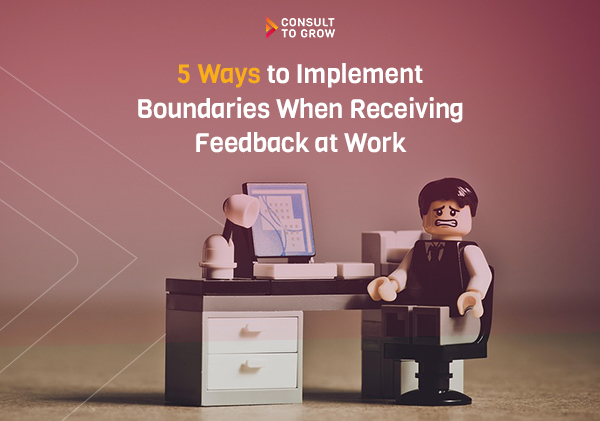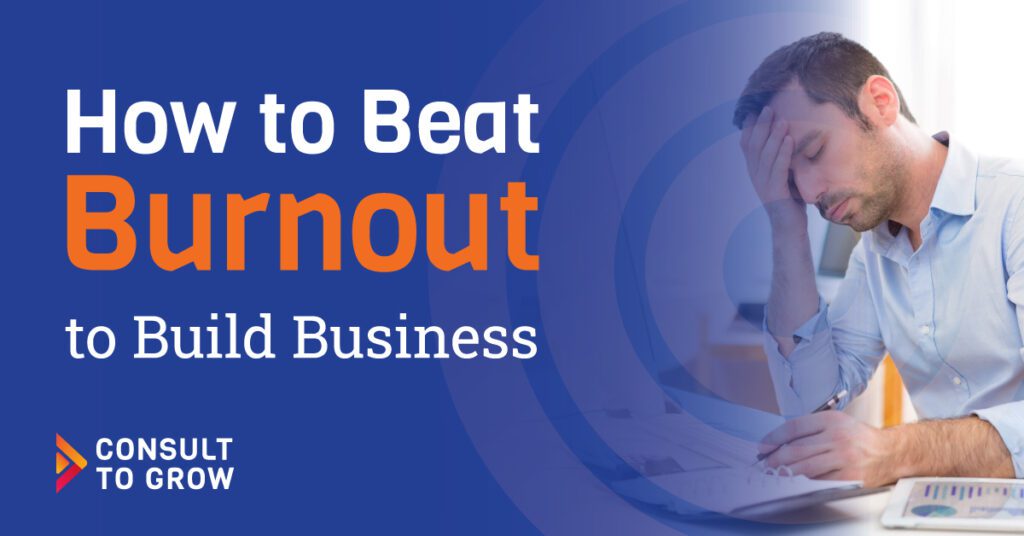
WHAT IS BURNOUT?
Burnout is a state of emotional, mental, and physical exhaustion caused by excessive and prolonged stress. Excessive and prolonged stress occurs when you feel overwhelmed and unable to meet constant demands.
Download the Beating Burnout Handout for Free
Signs you’re on the path to burnout:
- Every day is a bad day.
- Caring about your work or home life seems like a total waste of energy.
- You’re exhausted all the time.
- Most of your day is spent on tasks you find either dull or overwhelming.
- You feel like nothing you do makes a difference or is appreciated.
The negative effects of burnout can spill into every area of your life – including your home and social life. Burnout can also cause long-term changes to your body that make you vulnerable to illnesses like colds or flu.
Differences between Stress & Burnout
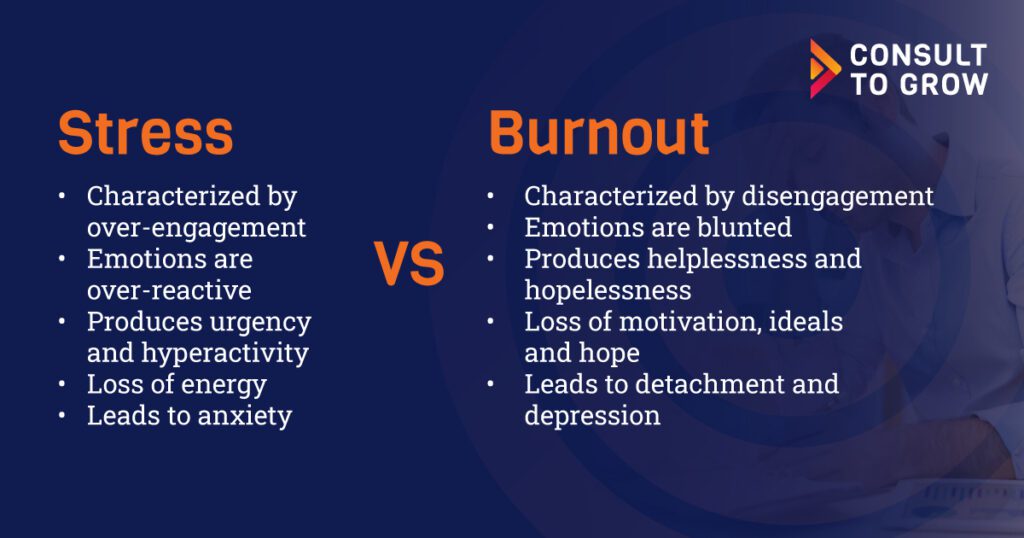
- Stress
- Characterized by over-engagement
- Emotions are over-reactive
- Produces urgency and hyperactivity
- Loss of energy
- Leads to anxiety
- Burnout
- Characterized by disengagement
- Emotions are blunted
- Produces helplessness and hopelessness
- Loss of motivation, ideals and hope
- Leads to detachment and depression
Download the Beating Burnout Handout for Free
MANAGING STRESS
Because reacting at the moment can often create more stress, it’s important to pause and take a minute (or hour or day) to engage in gentle self-care and take the space you need to gain a better understanding and perspective before taking action.
- Review and organize. Often the simple act of organizing the information about what we do and do not yet know and/or taking time to simply get organized can relieve stress. When we try to do too much or set unrealistic goals it is easy to feel overwhelmed.
- Take a break from it. There’s a reason so many people embrace mindfulness practices like meditation, deep breathing, or yoga. They help clear our minds and keep us in the moment so we can regroup and recharge in a quieter, calmer place.
- Keep it moving. Not only is exercise great at reducing stress, but sometimes just getting outside and taking a walk, finding a change of scenery, and disconnecting from our email and phone is really powerful.
- Give it a rest. Science has shown that stress and sleep are linked, with stress often leading to insomnia. Sleep-deprived people have significantly elevated levels of cortisol, the stress hormone, which can also lead to weight gain and brain fog. Getting enough sleep (at least 7 hours), and making that sleep regular, is one of the most powerful ways to keep stress at bay and drive overall health and wellbeing.
MANAGING BURNOUT
Understand the Causes of Burnout
In many cases, burnout stems from your job. Burnout is not caused solely by stressful work or too many responsibilities. Other factors that contribute to burnout, include work-related causes, lifestyle causes, and personality traits:
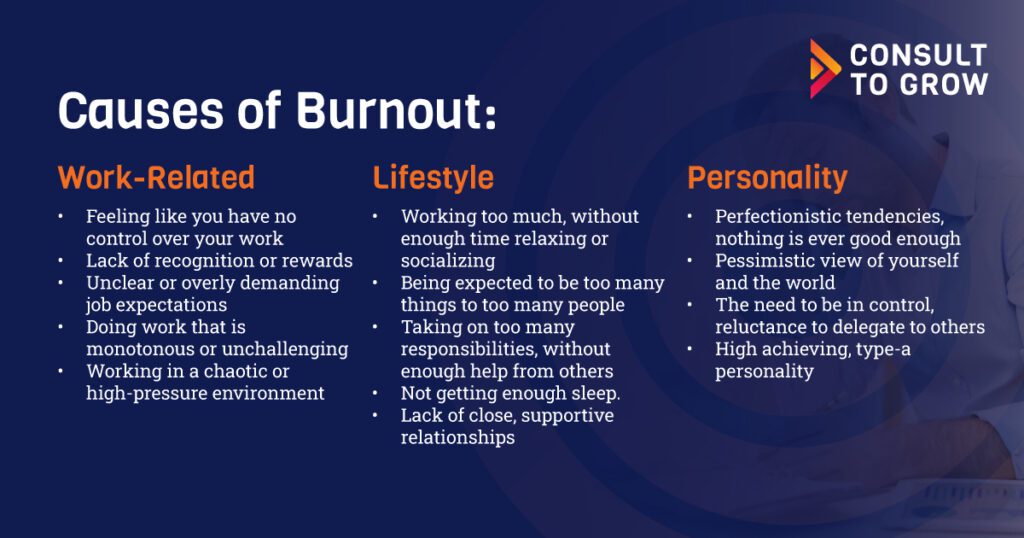
- Work-Related
- Feeling like you have no control over your work
- Lack of recognition or rewards
- Unclear or overly demanding job expectations
- Doing work that is monotonous or unchallenging
- Working in a chaotic or high-pressure environment
- Lifestyle
- Working too much, without enough time relaxing or socializing
- Being expected to be too many things to too many people
- Taking on too many responsibilities, without enough help from others
- Not getting enough sleep.
- Lack of close, supportive relationships
- Personality
- Perfectionistic tendencies, nothing is ever good enough
- Pessimistic view of yourself and the world
- The need to be in control, reluctance to delegate to others
- High achieving, type-a personality
Download the Beating Burnout Handout for Free
Understand the Signs of Burnout
Burnout is a gradual process that occurs over an extended period. You may not notice the signs and symptoms at first, but they get worse and worse as time goes on. Signs and symptoms of burnout may be physical, emotional, or behavioral.
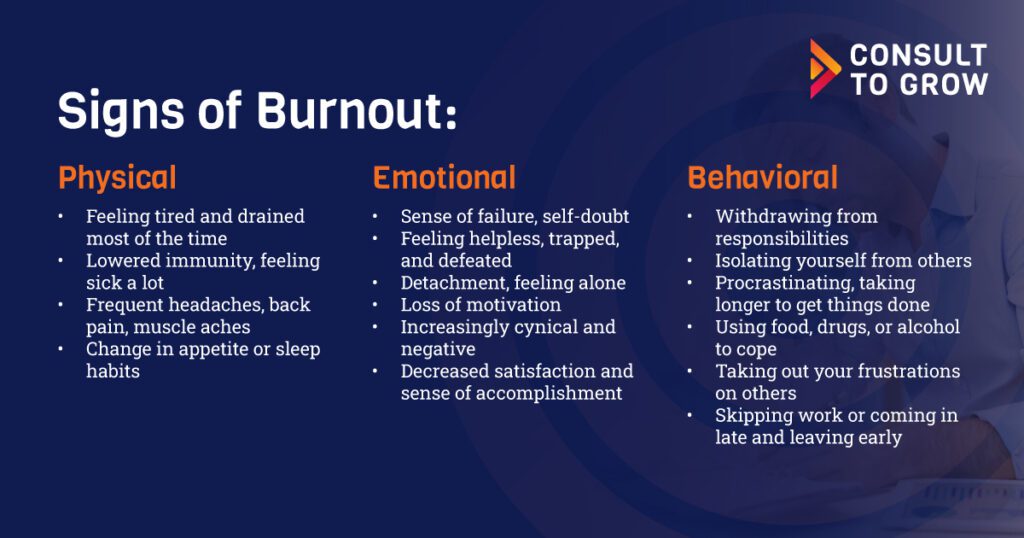
- Physical
- Feeling tired and drained most of the time
- Lowered immunity, feeling sick a lot
- Frequent headaches, back pain, muscle aches
- Change in appetite or sleep habits
- Emotional
- Sense of failure, self-doubt
- Feeling helpless, trapped, and defeated
- Detachment, feeling alone
- Loss of motivation
- Increasingly cynical and negative
- Decreased satisfaction and sense of accomplishment
- Behavioral
- Withdrawing from responsibilities
- Isolating yourself from others
- Procrastinating, taking longer to get things done
- Using food, drugs, or alcohol to cope
- Taking out your frustrations on others
- Skipping work or coming in late and leaving early
Download the Beating Burnout Handout for Free
Preventing Burnout
- Adopt healthy eating, exercising, and sleeping habits. When you eat right, engage in regular physical activity, and get plenty of rest, you have the energy and resilience to deal with life’s demands.
- Start the day with a ritual. Rather than jumping out of bed as soon as you wake up, spend a few minutes meditating, writing in your journal, doing gentle stretches, or reading something that inspires you.
- Set healthy boundaries. Don’t overextend yourself. Learn to say “no” to requests on your time. If you find this difficult, remind yourself that saying “no” allows you to say “yes” to the things that you truly want.
- Nourish your creative side. Creativity is a powerful antidote to burnout. Try something new, start a fun project, or resume a favorite hobby. Choose activities that have nothing to do with work.
- Learn how to manage stress. When you’re on the road to burnout, you may feel helpless. You have more control over stress than you may think.
Download the Beating Burnout Handout for Free
BURNOUT RECOVERY
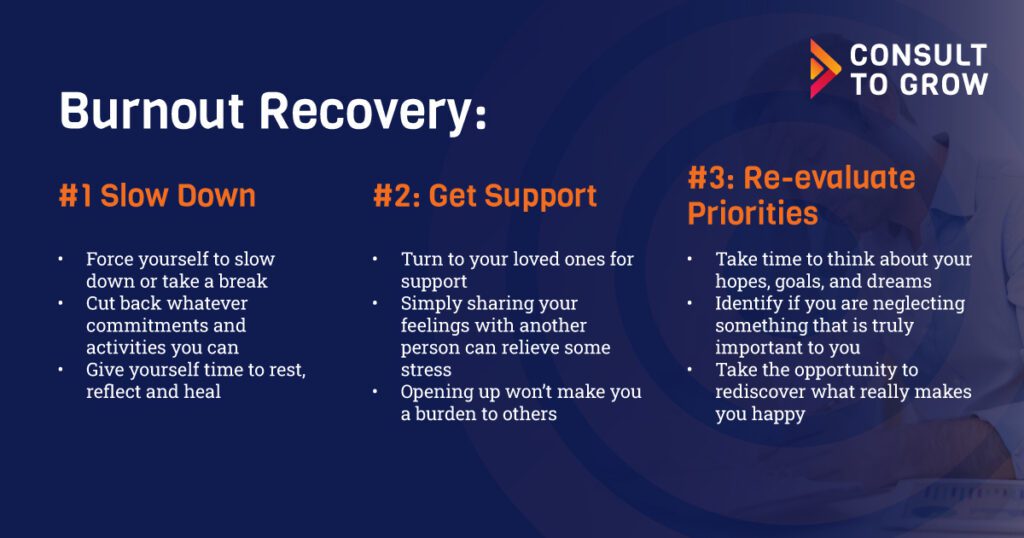
#1 Slow Down
- Force yourself to slow down or take a break
- Cut back whatever commitments and activities you can
- Give yourself time to rest, reflect and heal
#2: Get Support
- Turn to your loved ones for support
- Simply sharing your feelings with another person can relieve some stress
- Opening up won’t make you a burden to others
#3: Re-evaluate Priorities
- Take time to think about your hopes, goals, and dreams
- Identify if you are neglecting something that is truly important to you
- Take the opportunity to rediscover what really makes you happy
Coping with Burnout
- Actively address problems. Take a proactive rather than a passive approach to issues in your workplace, including stress at work. You’ll feel less helpless if you assert yourself and express your needs. If you don’t have the authority or resources to solve the problem, talk to a superior.
- Clarify your job. Ask your boss for an updated description of your job duties and responsibilities. Point out things you’re expected to do that are not part of your job description and gain a little leverage by showing that you’ve been putting in work over and above the parameters of your job.
- Take time off. If burnout seems inevitable, take a complete break from work. Go on vacation. Use the time away to recharge your batteries and take perspective.
Stress and burnout affect all of us but in different ways and varying degrees. It’s important to monitor when stress is becoming more than just a temporary concern. The information and advice above are great ways to manage both stress and burnout but don’t get down on yourself if they don’t work long term. It’s always best to talk to a trusted friend or a professional and get the help you need to feel your best.
Download the Beating Burnout Handout for Free
About Consult to Grow
Consult to Grow® provides various tools and services to help you develop people strategies to grow your team. We can expertly assess your HR infrastructure, develop custom Employer of Choice strategies, facilitate leadership meetings and retreats, help you design bonus and incentive programs, and design managing partner programs. Ready to get started?



